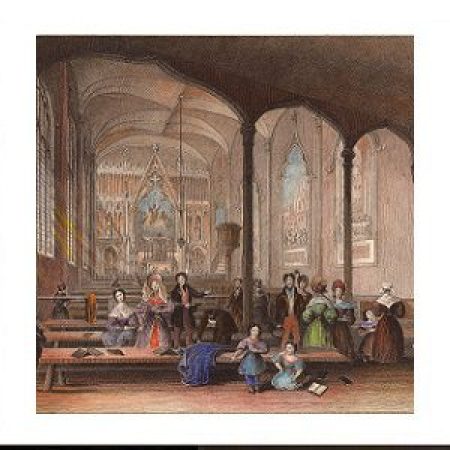The history of the survival of Catholicism in Winchester is closely linked to the fascinating story and drama of its survival in Britain and Ireland to the present day. After the Reformation, the city of Winchester and the county of Hampshire were still strongly Catholic. The new Protestant faith seems to have appealed little to the general population. Winchester itself was the ancient capital of England, with a Cathedral, abbeys, a convent and a school for poor scholars founded by William of Wykeham, a Chancellor of England. When Mary came to the throne in 1553 and Catholicism was officially restored in the country, Winchester was actually still staunchly Catholic. It was in Winchester Cathedral that Mary married Philip of Spain in 1554.
When Elizabeth 1 introduced the Act of Uniformity in 1558, Mass continued to be said in Winchester by the Dean and Canons of the Cathedral, the Warden and Fellows of Winchester College and the Master of St Cross. This, of course, eventually ceased as attendance at Common Prayer, as laid down in the Act, became compulsory. Anyone who refused to do so was labelled a Recusant, literally one who refuses.
There were a few Catholics who, despite the post-Reformation religious havoc wreaked by the Tudor and Stuart monarchs, refused to be coerced into abandoning their allegiance to the Pope. All this came at a high cost. To be a Catholic was to be a traitor. Hundreds of priests and lay people were tortured and executed in the sixteenth and seventeenth centuries. The present Catholic Church in Jewry Street, Winchester, is named St Peter and the Winchester Martyrs, in memory of those who died for their faith. It was built in 1926, following the Milner Hall, which still stands, which had been built by John Milner in 1792 and was then the first Catholic church to be consecrated in England since 1558.
The Winchester Catholic History Group was founded in 1996 to encourage interest in Catholic and English History. This year the Constitution has been updated and the name changed from ‘Group’ to ‘Society’, which better reflects its current activities. The Society has grown, has its own website and has a more diverse spread of speakers and lectures, without losing its core values.
The Chairman of the Society is Monsignor Tom McGrath, and its President Father Mark Hogan, the Parish Priest of St Peter’s, as the constitution requires. The committee has some non-Catholic members.
Following a very successful talk on Thomas Cranmer by Professor Sir Diarmaid MacCulloch, he agreed to become the Society’s first Honorary President. He is head of Ecclesiastical History, St Cross College, Oxford, and a frequent broadcaster on television and radio. A prolific author, his latest book is Thomas Cromwell – A Life (Allen Lane, 2018), which a reviewer dubbed ‘what Hilary Mantel left out’. His lecture in July 2019 in the Stripe Auditorium of the University of Winchester was attended by more than 280 members, guests and visitors.
The Society holds ten lectures a year, in the evening of the second Wednesday of the month in the Parish Centre, St Peters Catholic Church, Jewry Street, Winchester. The programme is varied and unusual and new members and visitors are always welcome.
Website: www.winchestercatholichistorysociety.com
Contributed by Valerie Oxenham.
-

Interior of the Milner Hall, Winchester, by G.S. Shepherd (1784-1862), engraved by J Shury & Son, 1838, from Robert Mudie’s Hampshire: Its Past and Present, Vol. 1, James Robbins, Winchester, facing p. 79 -

Milner Hall, Winchester, 2011 -

Plaque commemorating the history of the Milner Hall, St Peter St, Winchester -

Plaque of 1793 in the north porch of St Peter’s Catholic Church, Jewry Street, Winchester, showing thanks from the French priests who sought refuge in the city after the French Revolution

